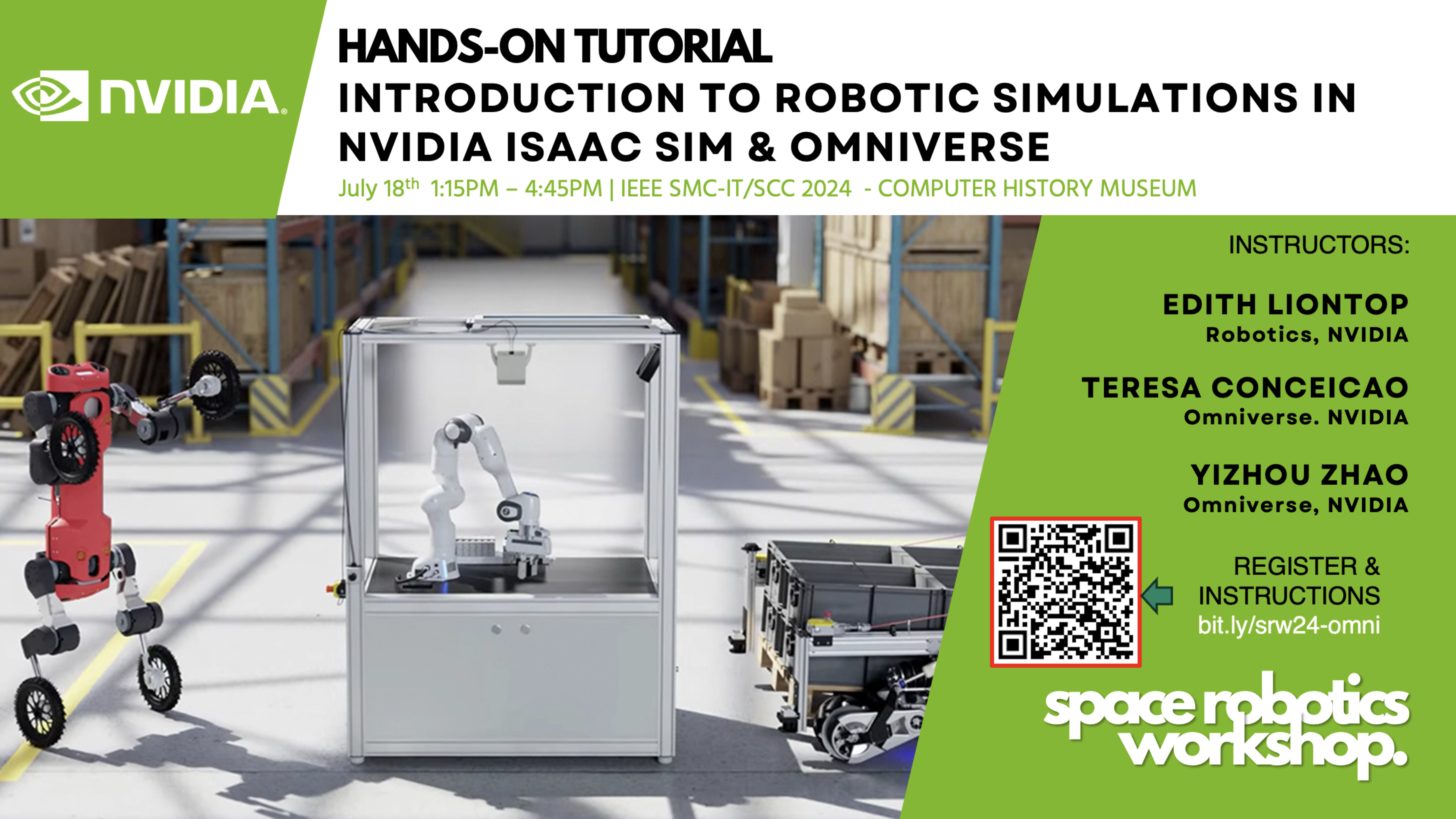The 1st Space Robotics Workshop is a two-day in-person seminar scheduled for July 17th and 18th, within the 2024 IEEE International Conference on Space Mission Challenges for Information Technology (SMC-IT) in Mountain View, CA. It will feature tutorials, panel discussions, and invited presentations centered around the integration of AI and novel software elements in robotics for space.
The field of space robotics is entering a transformative era marked by an array of ambitious missions and global collaborations. This period is characterized by significant advancements in robotic missions to celestial bodies such as the Moon, Mars, and beyond – exemplified by programs like NASA's VIPER, Artemis campaign, Psyche, Mars Sample Return, and future explorations of Jupiter's icy moons like Europa, and Saturn’s Enceladus and Titan moons. Further propelling this advancement is the collaboration between NASA, commercial entities – through initiatives like CLPS – and international partners, all converging to support these ambitious endeavors.
In this context, the scope of applications for space robotics is expanding exponentially. Robots, varying in design and function, are being tasked with a spectrum of critical roles – from station keeping and in-space servicing to complex assembly, manufacturing, and the utilization of in-situ resources (ISRU) for sustainable operations. Moreover, comprehensive exploration missions to lunar and planetary surfaces are becoming increasingly reliant on these robotic systems. This new era emphasizes the growing need for a shift from human-operated systems to semi-autonomous and eventually fully autonomous space robotics, powered by advanced AI technologies. Developing these AI systems demand new key challenges, including extensive and diverse datasets for training and validation, physically realistic simulators, energy-optimized edge computing, and self-verification and trustworthines of these algorithms.
Our workshop aims to address the broad spectrum of opportunities and challenges presented by this new era of space exploration by bringing together experts in terrestrial robotics, space robotics, AI, mission operations, and flight software. Discussions will focus on the specific requirements of space applications, how they can leverage shared technological solutions, and benefit from unified frameworks. The workshop will facilitate collaborative discussions, highlight current developments, identify key challenges, and strategize on the necessary research to advance robotics and autonomy in future space missions.
| TIME (PST) | TITLE | PRESENTERS |
|---|---|---|
| 10:30 AM - 10:35 AM | Welcome & Opening Remarks |
|
| 10:35 AM - 12 PM | Session 1: "Scaling up Robotics via Foundation Models: Exploring Opportunities and Challenges" |
|
| 12 PM - 1:15 PM | Lunch Break | |
| 1:15 PM - 3:15 PM | Session 2: "Multi-Modal Robotic Cooperation for Next-Gen Space Missions" |
|
| 3:15 PM - 3:45 PM | Coffee Break | |
| 3:45 PM - 5:15 PM | Session 3: "Space Use Cases for AI: Exploring Real Objectives and Challenges for Modern Robotics" |
|
| 5:15 PM - 8:15 PM | Banquet Dinner @ Ameswell Hotel | NASA astronaut Stephen K. Robinson |
| TIME (PST) | TITLE | PRESENTER(S) |
|---|---|---|
| 10:30 AM - 12 PM | Session 4: "Bots Before Boots: Venturing into New Worlds with Humanoid Robots as Modern Explorers" |
|
| 12 PM - 1:15 PM | Lunch Break | |
| 1:15 PM - 3:15 PM | Tutorial Part 1: "Introduction to Robotic Simulations in NVIDIA Isaac Sim & Omniverse" |
|
| 3:15 PM - 3:45 PM | Coffee Break | |
| 3:45 PM - 4:45 PM | Tutorial Part 2: "Introduction to Robotic Simulations in NVIDIA Isaac Sim & Omniverse" |
|
| 4:45 PM - 5:15 PM | Close Outs |

One day, everything that moves will be autonomous. Robotic automation has made significant strides forward, driven by advancements in hardware and artificial intelligence capabilities that have opened new avenues in simulation and the strive for autonomy.
This hands-on instruction-led tutorial will give a technical introduction to the Omniverse and Isaac SIM platforms, a cutting-edge solution for robotics and simulation.
We will start off with a generic presentation section to introduce use-cases, value, and vision of the platform and some examples of how it can be applied to the space industry. Next, we'll move over to a more technical hands-on lab where you'll dive into the simulation loop of a 3D engine, learning to initialize experiments with objects, robots, and physics logic, and build some small robotics control tasks and applications within the simulation environment.
The hands-on piece is a technical beginner level, and thus you don't need any prior knowledge of Isaac SIM, apart from basic Python understanding.
Note: We will use the NVIDIA Deep Learning Institute platform for the hands-on portion of this workshop. Attendees will be handed a personal code during the workshop, that will give them access to one of the self-paced paid courses. The codes will be shared during the workshop. These are personal, and can only be redeemed to one specific course only. You can find more information on how to redeem the DLI platform codes in the attached pdf. Additionally, course content and access to the environment will be given for up to 1 year after the workshop.
This tutorial session will be led by instructors:
Note: In this course, we will use an Omniverse application called Isaac SIM. More information and details can be found in the Isaac SIM documentation. However, you won't have to install Isaac SIM on your local laptop/machine for the workshop. Only the Streaming Client. It is also not required to have any previous knowledge of Isaac SIM, since this will be an introductory course.
If you have any questions, feel free to contact us at:
Copyright © IEEE SMC-IT/SCC 2024 - Privacy Policy